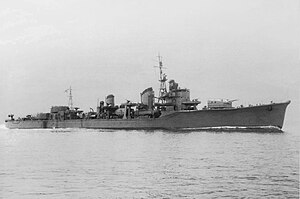Japanese destroyer Kiyoshimo
 Kiyoshimo off Uraga on 15 May 1944.
| |
| History | |
|---|---|
| Name | Kiyoshimo |
| Builder | Uraga Dock Company |
| Launched | 29 February 1944 |
| Completed | 16 May 1944 |
| Stricken | 10 February 1945 |
| Fate | Sunk in action, 26 December 1944 |
| General characteristics | |
| Class and type | Yūgumo-class destroyer |
| Displacement | 2,520 long tons (2,560 t) |
| Length | 119.15 m (390 ft 11 in) |
| Beam | 10.8 m (35 ft 5 in) |
| Draught | 3.75 m (12 ft 4 in) |
| Speed | 35 knots (40 mph; 65 km/h) |
| Complement | 228 |
| Armament |
|
Kiyoshimo (清霜, "Clear Frost") was a Yūgumo-class destroyer of the Imperial Japanese Navy.
Design and description
[edit]The Yūgumo class was a repeat of the preceding Kagerō class with minor improvements that increased their anti-aircraft capabilities. Their crew numbered 228 officers and enlisted men. The ships measured 119.17 meters (391 ft 0 in) overall, with a beam of 10.8 meters (35 ft 5 in) and a draft of 3.76 meters (12 ft 4 in).[1] They displaced 2,110 metric tons (2,080 long tons) at standard load and 2,560 metric tons (2,520 long tons) at deep load.[2] The ships had two Kampon geared steam turbines, each driving one propeller shaft, using steam provided by three Kampon water-tube boilers. The turbines were rated at a total of 52,000 shaft horsepower (39,000 kW) for a designed speed of 35 knots (65 km/h; 40 mph).[3]
The main armament of the Yūgumo class consisted of six Type 3 127-millimeter (5.0 in) guns in three twin-gun turrets, one superfiring pair aft and one turret forward of the superstructure.[2] The guns were able to elevate up to 75° to increase their ability against aircraft, but their slow rate of fire, slow traversing speed, and the lack of any sort of high-angle fire-control system meant that they were virtually useless as anti-aircraft guns.[4] They were built with four Type 96 25-millimeter (1.0 in) anti-aircraft guns in two twin-gun mounts, but more of these guns were added over the course of the war. The ships were also armed with eight 610-millimeter (24.0 in) torpedo tubes in a two quadruple traversing mounts; one reload was carried for each tube. Their anti-submarine weapons comprised two depth charge throwers for which 36 depth charges were carried.[2]
Construction and career
[edit]This section includes a list of references, related reading, or external links, but its sources remain unclear because it lacks inline citations. (October 2024) |
At the Battle of Leyte Gulf and the Battle of Sibuyan Sea Kiyoshimo was assigned to the 1st Diversion Attack Force. During an air attack, the destroyer received one direct hit and five near misses. She assisted the battleship Musashi and rescued survivors after the crew of Musashi abandoned ship. She was repaired 8–12 November at Singapore.
On 26 December 1944, then with the San Jose bombardment force, Kiyoshimo was crippled by two direct bomb hits in attacks by U.S. Army bombers during the approach to Mindoro, Philippines. The ship was then finished off by a torpedo from U.S. PT-223, 145 miles (233 km) south of Manila (12°20′N 121°0′E / 12.333°N 121.000°E); 82 were killed and 74 injured. The destroyer Asashimo rescued 169 survivors, including ComDesDiv 2, Captain Shiraishi Nagayoshi, and Lieutenant Commander Kajimoto; U.S. PT boats rescued five others.
Notes
[edit]References
[edit]- Campbell, John (1985). Naval Weapons of World War II. Annapolis, Maryland: Naval Institute Press. ISBN 0-87021-459-4.
- Jentschura, Hansgeorg; Jung, Dieter & Mickel, Peter (1977). Warships of the Imperial Japanese Navy, 1869–1945. Annapolis, Maryland: United States Naval Institute. ISBN 0-87021-893-X.
- Sturton, Ian (1980). "Japan". In Chesneau, Roger (ed.). Conway's All the World's Fighting Ships 1922–1946. Greenwich, UK: Conway Maritime Press. pp. 167–217. ISBN 0-85177-146-7.
- Whitley, M. J. (2000). Destroyers of World War Two: An International Encyclopedia. London: Cassell & Co. ISBN 1-85409-521-8.
